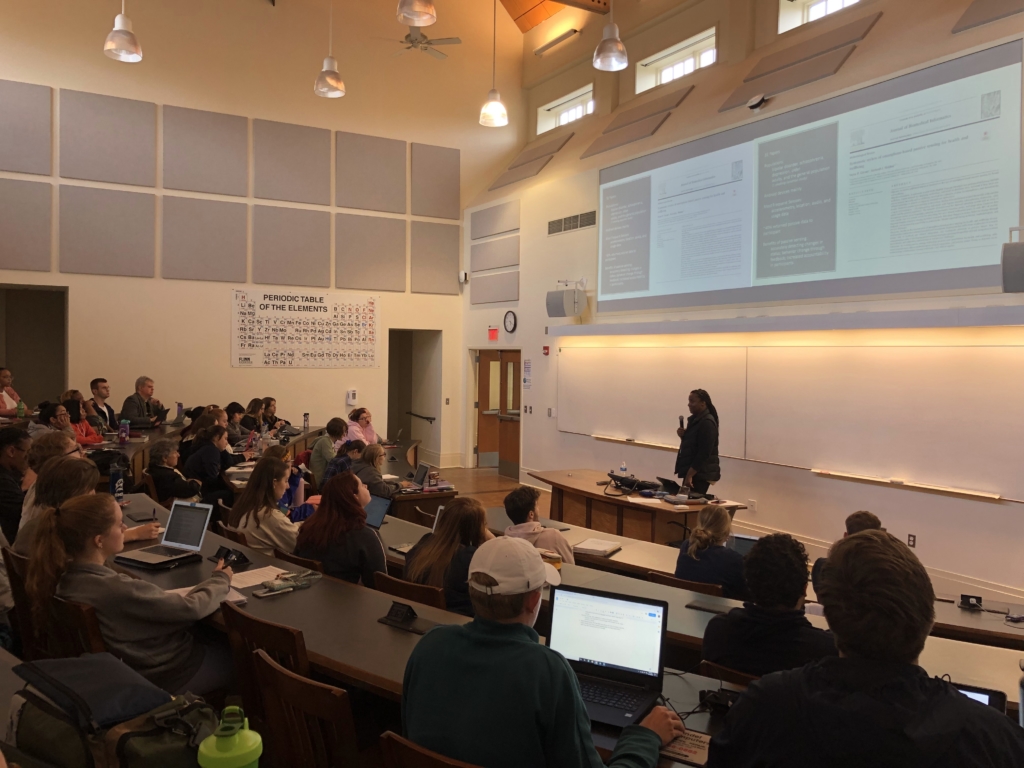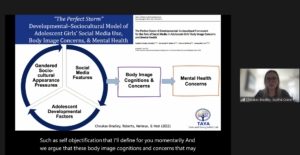In choosing themes for our psychology lecture series, we look for topics that have broad interest and that generate scientific research from a variety of perspectives. All invited speakers meet and network with St. Mary’s College psychology students. Lectures may be used to fulfill the Lecture Reflection Requirement in PSYC 206 and PSYC 493/494. All lectures are free and open to the general public. We are grateful to our 2024-25 Lecture Series sponsor: the Lecture & Fine Arts Committee.
2024-25 Lecture Series: The Psychology of Leadership
The psychology department welcomes you to join us for this year’s lecture series which will explore various elements of the psychology of leadership by inviting four scholars who study the psychology of leadership from varied disciplinary perspectives to present their work. Potential topics include leadership training in youth, advocacy of psychology at the federal level, applied organizational psychology, and military leadership during challenging times.
Friday, September 20 @ 11:30 am – 12:30 pm; Goodpaster Hall 195
Dr. Yoshie Tomozumi Nakamura (The George Washington University) will speak on Enhancing Leadership Communication in Complex Environments.
This talk explores the role of leadership communication in everyday relationship-building within organizations, communities, and societies. Focusing on leader-member interactions through a relational leadership lens, it emphasizes the importance of empathy and ethics. Drawing from her leadership research, Nakamura will discuss leadership conversations as two-way influence relationships, highlighting their interdependencies and collective role in meaning-making. By analyzing non-verbal and verbal cues between leaders and members, the research reveals the impact of gendered leadership on emotions, the role of humor in fostering emotional bonds, and the influence of cultural dynamics. Viewing leadership as a social process, this session invites attendees to reflect on the self in relation to others and society, and to explore the practice of leadership conversations in various contexts. By emphasizing the importance of empathy, ethics, relationality, and inclusivity, this talk offers valuable insights for advancing leadership communication skills in today’s complex professional environments.
Dr. Yoshie Tomozumi Nakamura is an associate professor in the human and organizational learning department at the Graduate School of Education and Human Development, The George Washington University. Her research focuses on leadership development through the lens of adult learners’ minds, brains, and behavior, with a particular emphasis on intra- and interpersonal relationships in leadership. Her international research extends beyond the U. S., encompassing global studies, including those conducted in Japan. Dr. Nakamura is a 2024 Assistant Professor Award recipient from the University Council for Workforce & Human Resource Education. One of her publications received the Elwood F. Holton, III, Research Excellence Award in Human Resource Development Review journal. Before joining the George Washington University, she served as an adjunct assistant professor at Teachers College, Columbia University. She also worked as head of academic learning and neuroscience at Columbia Business School’s executive education department, where she directed the Neuroscience to Enhance Leadership Development program.
Friday, November 15 @ 11:30 am – 12:30 pm; Goodpaster Hall 195
Dr. Debra M. Kawahara (American Psychological Association) will speak on Leadership for the Future: Transforming Individuals, Communities and Society.
Developing transformational leaders for our ever-changing world is becoming more critical as societal issues become increasingly complex. Leadership and its outcomes have primarily been based on western dominant society in psychology and other related fields. This is often referred to as the WEIRD world (Western, educated, industrialized, rich and democratic) (Henrich et al., 2010). Yet, many people within the United States and globally do not fit these characteristics. In fact, most people live in regions designated as the Global South and constitute the Global Majority. Given this fact, how can leaders and leadership be more inclusive, equitable and just for all? This presentation will outline values, concepts, and behaviors from a transformational feminist leadership model that are important for successful and effective leaders in a global world. The presenter will share examples of how the values and concepts have been and will be used in her leadership roles, particularly in her role as the 2025 president of the American Psychological Association.
Dr. Debra M. Kawahara is the 2025 President of the American Psychological Association. She is also associate dean of academic affairs and distinguished professor at the California School of Professional Psychology and the executive director of the Illumination of Mindfulness Institute at Alliant International University. Known as a multicultural and feminist scholar, her work centers on intersectionality, women’s issues, leadership, and the application of multicultural and feminist values and social justice principles in practice. She is widely published and has presented nationally and globally extensively. In 2018, she became the Editor-in-Chief of Women & Therapy. Her previous leadership roles include being an APA board of director and representative to the APA Council of Representatives, an APA Finance Committee member, an Advisory Committee member for the Leadership Institute for Women in Psychology (LIWP), Divisions on Social Justice representative, Lead Coordinator for the National Multicultural Conference & Summit, and a National Council of Schools and Programs in Professional Psychology delegate. She is a Fellow of the American Psychological Association as well as the Asian American Psychological Association. In recognition of her work, several awards have been bestowed on her, including an APA Presidential Citation; the Shining Star Award at the National Multicultural Conference & Summit; and the Pioneer Award from the Psychology on Asian Pacific American Women.
Friday, January 17, 2025 @ 11:30-12:30; Goodpaster Hall 195
Dr. Crystal Hoyt (University of Richmond) will speak on “Mindsets Matter for Diversifying Leadership.”
Diversifying leadership is essential for fostering more inclusive and equitable institutions, while also strengthening their capacity to navigate and address complex societal issues effectively. Members of underrepresented groups are at a distinct disadvantage in leadership in part because of pervasive stereotype-based expectations that serve to challenge their legitimacy. Whereas explicit biases against women and minorities have decreased over recent years, pernicious subtle biases work to undermine the tenets of meritocracy and limit access to power. Not only do subtle gender and racial stereotypes bias who people see as “fitting” the role of leader, these expectations of inferiority can be psychologically burdensome for those targeted. Importantly, these barriers can be bolstered or undermined by the belief systems, or mindsets, that people use to shape the meaning of these stereotypes. A greater understanding of how mindsets can undercut identity-based biases can offer a path forward in promoting greater diversity in leadership.
Dr. Crystal L. Hoyt is professor of leadership studies and psychology and the Thorsness Endowed Chair in Ethical Leadership at the University of Richmond. Dr. Hoyt’s scholarship resides at the intersection of human belief systems (e.g., mindsets, stereotypes, and ideologies) and social justice and wellbeing. She is a fellow of the Association for Psychological Science and the Society for Personality and Social Psychology, and her research has been funded by the National Science Foundation. She has published over 80 journal articles and book chapters and has co-edited three books. Her research appears in journals such as Psychological Science, Journal of Experimental and Social Psychology, Personality and Social Psychology Bulletin, and The Leadership Quarterly. Her research and writing has been featured in news outlets, including the New York Times, the Washington Post, the Today Show, and NPR’s Tell Me More, among others.
Friday, March 28, 2025 @ 11:30-12:30; Goodpaster Hall 195
Dr. Stephen Zaccaro (George Mason University) will speak on “Leadership Memes and Stories: Implications for Early Leadership Development.”
Leadership development can start early in childhood and adolescence with the emergence and growth of leader mindsets. These include leader identity and leadership self-efficacy. These mindsets are linked to growth in leader skillsets. In this talk, Dr. Zaccaro will provide a framework describing four sets of leadership memes. The memes are shown in stories, art and literature about leadership that have been conveyed since antiquity. They contribute to the development of leader mindsets in children. He will also describe two research studies on early leadership development. One of them examined leadership themes in popular television programs watched by children and adolescents. The second explored the concept of motivation to engage in leadership development and its link to agency in such development.
Dr. Stephen J. Zaccaro is a professor of psychology at George Mason University, Fairfax, Virginia and President of Zaccaro Leadership Systems, LLC. He is also an experienced leadership development consultant. He received his PhD in social psychology from the University of Connecticut. He has been studying, teaching, and consulting about leadership and teams for over 40 years. He has written over 150 journal articles, book chapters, and technical reports on leadership, group dynamics, and team performance. He has authored a book titled, The Nature of Executive Leadership: A Conceptual and Empirical Analysis of Success and has co-edited six other books on the topics of organizational agility, organizational leadership, leader development, multiteam systems, cyber-security, and occupational stress. He has worked with executives and managers from private industry as well as from the educational, nonprofit, government, and military sectors. He serves on the editorial boards of The Leadership Quarterly, Advances in Global Leadership, Journal of Leadership and Organizational Studies, and Journal of Character and Leadership Development. He is also an associate editor for the Journal of Business and Psychology. He is a Fellow of the Association for Psychological Science, and of the American Psychological Association, Divisions 14 (Society for Industrial and Organizational Psychology) and 19 (Military Psychology). He is also the current president of the Interdisciplinary Network for Group Research (INGRoup)
Past Lecture Series Topics
- 2023-24: The Psychology of Conflict and Peace
- 2022-23: The Psychology of Close Relationships
- 2021-22: The Psychology of COVID-19 and Public Health
- 2020-21: Intervention Science: Harnessing Psychology to Address Oppressive Systems
- 2019-20: Psychology of the Opioid Crisis
- 2018-19: Psychology of Work and Play
- 2017-18: Psychology of Oppression
- 2016-17: Psychology Across the Globe: Cross-Cultural Perspectives
- 2015-16: Autism Spectrum Disorder: Fact and fiction
- 2014-15: Benefits and Risks of Technology Use on Children in the Home and at School
- 2013-14: Health and the Obesity “Crisis”
- 2012-13: Diagnosis, Treatment, and Prevention
- 2011-12: Populations in Need


